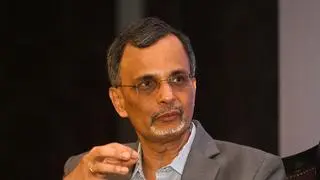The prospects of a soft landing have improved for the global economy, but there are multiple challenges, including geopolitical tensions and supply chain disruptions, with uncertainties looming on the horizon, said RBI Governor Shaktikanta Das.
“We need to chalk out an effective strategy for global co-operation and coordination to deal with multiple challenges afflicting the global economy.
“Multilateralism must be re-energised. In this regard, agreements on a “critical minerals corridor” and a “food corridor” for safeguarding food security are necessary. Such arrangements have to be fair and equitable,” Das said in his keynote address at the 59th SEACEN (South East Asian Central Banks) Governors’ Conference in Mumbai.
The governor observed that there is a need to develop co-operation in areas of common interest and urgent needs, such as climate change, where no country can devise strategies on its own. A smooth and orderly green transition is necessary to avoid disruptions to economic activity and loss of growth potential.
EMEs: Need to enhance green capital flows
“While the investment needs for a smooth green transition are large, the actual financial flows to green projects are highly skewed and are, by and large, concentrated in advanced economies.
“As a result, there is a need to enhance green capital flows to EMEs (emerging market economies). At the same time, we have to be mindful of the potential financial stability implications of the green transition,” Das said.
The Governor highlighted India’s experience in harnessing digital public infrastructure (DPI) for advancing financial inclusion and productivity gains through cost reductions.
“The linkage between the Indian UPI (Unified Payments Interface) and the fast payment systems of a few other countries drives home the potential of the UPI to become an international model for cross-border payments,” he said.
While new technological developments like artificial intelligence (AI) and machine learning (ML) can bring about significant improvements in the efficiency and productivity of businesses, Das emphasised that necessary safeguards need to be put in place to prevent the misuse of technology.
In particular, global financial market regulators need to be vigilant about the possible misuse of AI and ML in perpetrating financial fraud.
“In an uncertain world, central banks need to be proactive to better serve the objectives of price and financial stability. In this environment, collaboration is not an option but a necessity. We need greater resolve and coordination to make significant progress in dealing with global challenges,” the governor said.
Regime shifts
The Governor observed that regime shifts (from a ‘low for long” monetary policy regime before the pandemic to revive growth to “higher for longer” rates to fight inflationary pressures following the war in Ukraine) in the presence of debt overhang in an environment of high interest rates and low growth raise concerns on macroeconomic stability in many countries.
“Higher interest rates not only raise the interest servicing burden of heavily indebted countries but also impact the balance sheet of banks and financial institutions, as it was seen during the recent banking sector turmoil in advanced economies.
“In an extreme sense, high indebtedness of countries may constrain monetary policy due to sharp trade-off between price stability and financial stability,” Das said








Comments
Comments have to be in English, and in full sentences. They cannot be abusive or personal. Please abide by our community guidelines for posting your comments.
We have migrated to a new commenting platform. If you are already a registered user of TheHindu Businessline and logged in, you may continue to engage with our articles. If you do not have an account please register and login to post comments. Users can access their older comments by logging into their accounts on Vuukle.